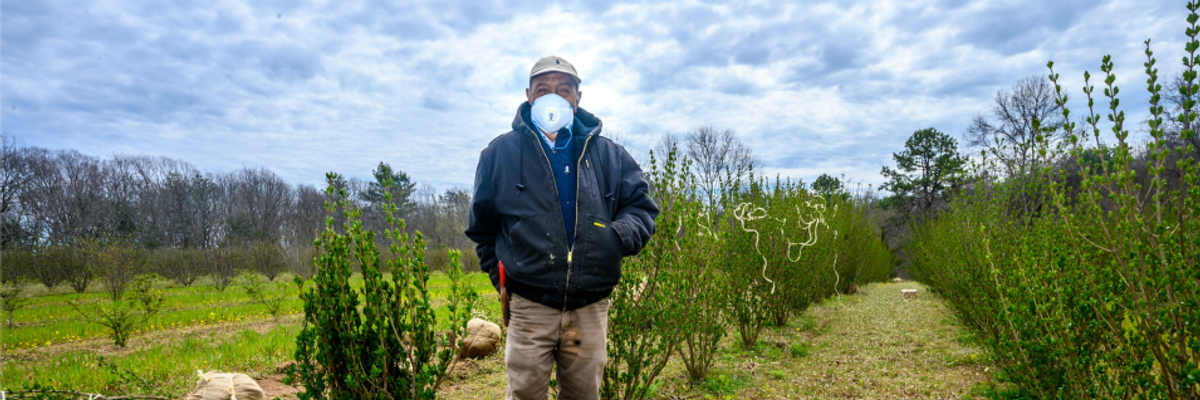We've put Joe Biden in the White House ... but what do we get back for that? We get a real possibility of winning some progressive policies. Not that he will turn into a fireball of democratic populism, but unlike in 1992 and 2008, when then-President Bill Clinton and then-President Barack Obama fleetingly raised hopes that progress was possible, respectively, two new factors give progressive proposals a greater chance this time.
One: Biden himself. Despite a long career representing Delaware, the home state of corporate America, a core part of Biden's political makeup is that he's Joe Labor. He comes to the job with a genuine affinity for working stiffs. He's comfortable in union halls and working-class bars, and he unabashedly campaigned as "a union guy." Neither Clinton nor Obama had that in them. For Biden, labor rights are about showing gut-level respect for working families, caring a bit less about the wealth of Wall Street and more about the well-being of workers.
Two: you and me. This is not '92 or '08, when our incoming presidents simply said, "Thank you and goodbye," to grassroots backers and then handed the government's economic keys to Wall Street bankers and corporate lobbyists. We won't allow Biden to do that, and he knows it. Today, there's an organized, battle-tested left on alert in practically every congressional district. It includes street-savvy and digitally connected movements of color, scrappy labor organizers and mobilizers, aggressive contingents of climate activists, and ever-watchful Berniecrats and Elizabeth Warren enthusiasts. Plus, we now have a growing cadre of unwilting agitators who're members of Congress, willing to expose and oppose insider sellouts.
This time, progressive forces are neither weak nor meek, and we're not about to be shushed or shooed away by Joe or a go-slow establishment. We're akin to the insistent forces of fundamental change who asserted themselves 89 years ago after Franklin D. Roosevelt won the presidency. FDR had not run as a fiery New Dealer but as a centrist Democrat promising little more than to rid the White House of the clueless, nearly comatose former President Herbert Hoover. The moment he was elected, militant grassroots movements, along with such popular political firebrands on his left as Huey Long, Maury Maverick and Upton Sinclair, were in his face. They are the ones who created the historic New Deal reform agenda ... and then made Roosevelt spend political capital to pass it.
The USDA's top leadership has been somewhere between indifferent and hostile toward the majority of workaday rural people who need an ally.
The parallels are not exact, but many of the dynamics of that period are in play again, and there's one big lesson from the New Dealers we should heed: Push hard and fast. We can't just settle for sweeping out, disinfecting and patching up our national house after former President Donald Trump's four-year plunderfest. A fundamental, comprehensive structural rebuild must be our demand, including such policy areas as health care, immigration, environment, civil justice, labor law and infrastructure. But here's another huge area of moral, cultural and economic significance that must become a priority for a major policy overhaul--an area that the Democratic Party and most
progressives have ignored for decades, to the detriment of millions of people and our own political strength: the U.S. Department of
Agriculture.
Quick, name the ag secretaries under Jimmy Carter, Clinton and Obama, representing 20 years that Democratic presidents had control of ag and rural policies. Few Americans can name even one, because ... well, what did they do, even as crisis after crisis ripped through the farmlands and communities they were supposed to serve?
Consider Biden's current nominee, Tom Vilsack. He actually tried to resign as secretary under Obama in 2015, complaining, "There are days when I have literally nothing to do." Seriously? At the time whole towns were boarding up, massive hog factories were exploiting farmers and local residents, states were slashing food assistance, climate change was advancing relentlessly and more? Get to work Mr. Secretary! Vilsack subsequently found work as chief Washington lobbyist for dairy-exporting corporations, drawing a million-dollar annual paycheck. Meanwhile, every day, two more U.S. dairy farms go bankrupt under low milk-price policies he sanctioned. Does he not think farmers notice ... and turn Republican?
As a former agriculture commissioner of Texas, I know that the USDA (created in 1862 by then-President Abe Lincoln to be what he called "The People's Department") could become a transformative force for the Common Good. But our recent presidents have written the position off as a Cabinet slot meant to keep the corporate giants of agribusiness content and in charge. Thus, the USDA's top leadership has been somewhere between indifferent and hostile toward the majority of workaday rural people who need an ally.
So, let's become that ally. Here's a chance for progressives to rally a broad grassroots constituency to refocus the work of this huge public resource and make it The People's Department again. The tools for making this fundamental structural change are in place, and the political energy for success needs to come from the people themselves.
Impossible? That's what those who pushed hard and fast for the New Deal were told.



